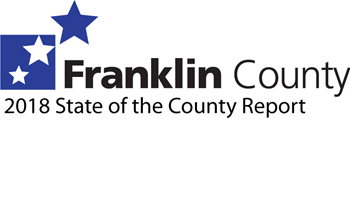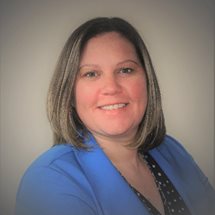A LETTER FROM JOHN O’GRADY, FRANKLIN COUNTY COMMISSIONER

Hello and welcome to the April edition of Commissioner Connection! My colleagues, Kevin Boyce, Marilyn Brown, and I are particularly excited by this edition of our newsletter because April is both Earth Month and National County Government Month, and we’ve got some great things to share with you on both of those fronts.
Last week, I was honored to be asked to speak to the latest graduates of the county’s Green Corps program. This partnership with the Franklin Park Conservatory and other partners started in 2010, and provides training for young adults in several horticultural professions. If you’re interested in Green Corps, you’re in luck. The program is featured a little later in this newsletter. Also featured later in the newsletter are a few of our efforts to help preserve the environment in our Public Facilities Management and Fleet Management departments.
Another environmentally friendly initiative that we passed earlier this month will provide each Board of Commissioners employee with a bus pass to ride COTA for free. The effort is part of a program that covers up to 5,000 employees of many different downtown businesses and agencies, and is expected to reduce the high demand for parking around the county courthouse complex, freeing up more than 2,000 downtown parking spaces each day by taking those cars off the road. It’s a benefit to our employees, and to all of the residents of Franklin County.
Throughout the years, the Franklin County Board of Commissioners has repeatedly reaffirmed its commitment to environmentally responsible and sustainable policies. From the ones I’ve mentioned here, to our multiple solar arrays, to our contract that sources only renewable energy for the county’s downtown buildings, to our recent SolSmart Award recognition, I’m proud of all of the ways that we’re living up to that commitment and helping to preserve our community’s natural resources for future generations of Franklin County residents.
Another highlight of National County Government Month is that it’s the time each year that we release the annual State of the County report. You can read all about what the county commissioners’ team has been up to over the past year a little later in the newsletter, and already in 2018, the commissioners have been hard at work for our residents. We joined the nationwide lawsuit against opiate producers and distributors, created a new family leave plan for employees, signed on to commitments to make our county age-friendly and to ensuring pay equity between men and women, and graduated 21 students from a new pre-apprenticeship program designed to move them from the social services rolls to good, middle class jobs in the skilled construction trades.
Spring really is a busy and exciting time at the county! Thanks again for taking the time to read our newsletter, and I hope that you’ll also be sure to check out the State of the County report in addition to all of the other exciting news we have for you in the newsletter.

2018 STATE OF THE COUNTY REPORT

Each year, the Board of Commissioners issues an annual State of the County Report to update residents on the health and progress of Franklin County. This year, once again, the commissioners are pleased to be able to report that the state of the county is strong. To see the full report, visit
https://report.franklincountyohio.gov/.
GREEN CORPS HELPING TO GROW OUR COMMUNITY FROM THE INSIDE OUT
Since 2010, the Board of Commissioners

has partnered with the Franklin Park Conservatory and Botanical Gardens on an initiative to help young, low-income, adults to build the skills they’ll need for jobs in the horticulture and landscaping industries. The ten-week, 320-hour program provides work clothes and tools, classroom instruction, hands on & real world experience, guest speakers, networking, and a $10 per hour stipend while in training. Graduates go on to well-paid, middle class jobs in the growing green sector of our economy.
Franklin Park personnel administer the program with funding from the county, and in partnership with the Workforce Development Board of Central Ohio, IMPACT Community Action, and Eckard Connects. The students also participate in internships with private companies in the field, learn from guest speakers, and go on field trips to explore the variety of landscaping, urban farming & food production, community gardening, and urban green spaces in Franklin County. Classroom and practical work topics include plant propagation, botany basics, organic gardening practices and design, food cultivation, arboriculture, and landscaping. The students also learn personal development and financial literacy skills in classes on job readiness, conflict resolution, and starting a small business.
Green Corps helps to grow the students into fulfilling careers that strengthen their roots in our Franklin County community. To learn more about Green Corps, visit
https://www.fpconservatory.org/education-programs/outreach-programs/green-corps/. To learn more about the commissioners’ commitment to job creation and economic development, visit
https://commissioners.franklincountyohio.gov/core-principles/job-creation.
RECYCLING RIGHT HELPS KEEP FRANKLIN COUNTY GREEN
Guest Column
By Ty Marsh, Executive Director of SWACO
 With Earth Day just around the corner, so many of us are considering what more we can do to protect our environment and live more sustainable lives. Making the simple yet effective effort to recycle at home and work is an easy way to be green on Earth Day – April 22 – and all year long.
With Earth Day just around the corner, so many of us are considering what more we can do to protect our environment and live more sustainable lives. Making the simple yet effective effort to recycle at home and work is an easy way to be green on Earth Day – April 22 – and all year long.
When we recycle right, our actions reduce pollution, support jobs and conserve precious natural resources.
But we should not mistake the act of tossing any item into a recycling bin for recycling. We must first determine whether it belongs there.
Perhaps you’ve heard of the term
wish-cycling.
If not, consider this: Disposable coffee cups look like they can be recycled, don’t they? They’re made of paper; they’re easy to rinse. After finishing a beverage from our favorite java haunts, many of us toss those cups into our home or office recycling bin, feeling a sense of satisfaction for doing our small part for the environment.
Unfortunately, those coffee cups contain a plastic liner which makes them unable to be recycled.
Wish-cycling refers to the act of placing an item in a recycling bin that we hope will be recycled even if we suspect it will not be.
We’ve all done it. But, despite our best intentions, wish-cycling does more harm than good.
Most recycling centers use complex machines that are designed to separate plastics, paper, aluminum, and other materials. Unfamiliar items – such as plastic bags, wire, hoses and clothing – can jam up or damage the machine, costing time and money. SWACO recently conducted a public opinion survey of 600 Franklin County residents. This is the first public opinion poll to provide detailed and statistically correct information about attitudes toward recycling in our community.
We learned that our community largely is one that cares deeply about the environment and is committed to recycling.
We also learned that there is probably a lot of wish-cycling taking place.
Approximately 93 percent of respondents view recycling as a point of pride in their community, and 90 percent said that they recycle for altruistic reasons such as protecting the environment, keeping waste out of the landfill or conserving resources. These positive motivators for recycling may also contribute to many residents trying to recycle items that should be put in the trash.
Almost half of the respondents to our poll acknowledged confusion about what materials can be recycled. Among the items respondents said they believe can be put in the recycling bin are plastic tubs like those used for butter or yogurt (66 percent), ice cream cartons (57 percent) and plastic shopping bags (39 percent).
I wish all these items could be recycled through our community’s curbside programs. But because they cannot be processed by the equipment at the recycling center, or there is not currently a viable market for them, they are not currently accepted in Franklin County’s curbside recycling program.
This year, SWACO is taking on the confusion that leads to counterproductive wish-cycling. We’re providing residents with simple guidance about what can be recycled at the curb in Franklin County.
Paper, flattened cardboard, plastic bottles and jugs, glass bottles and jars, metal cans and cartons all can be placed in curbside recycling bins. Plastic bags, coffee cups, yogurt cups, plastic or foam food containers, hoses, wires or chains all must be kept out.
That doesn’t mean all these items need to go into the landfill. Plastic bags
can be recycled at more than 100 Franklin County retail locations located at
www.swaco.org/BringMeBack. Yogurt containers
are accepted at Whole Foods. As for those coffee cups, remember to bring a reusable travel mug and you’ll be on your way to reducing your waste.
I love this community’s passion for recycling, including the reluctance of many of our residents to throw anything in a wastebasket. Beyond recycling, there are many other responsible alternatives to adding waste to the landfill, including reuse, donations and composting.

With increased education and awareness,
SWACO will promote all these options. And on this Earth Day we can resolve to make wish-cycling a thing of the past.

SPOTLIGHT ON A COUNTY EMPLOYEE - MICHELLE MISSLER

The Franklin County Office on Aging is funded in-part via a levy, and also as part of the Board of Commissioners’ annual budget. The agency provides centralized access to diverse programs and individualized services for older adults, dependent adults, and their families, and is overseen by the commissioners. The Office on Aging provides some services directly, contracts for others, and also serves as a one-stop clearinghouse for information and referrals to services available to older residents in Franklin County. Today, when a resident contacts the Office on Aging, they may find a new voice on the other end of the line; Michelle Missler is the new Director of the department, and has been in that role just since March 1
st.
Welcome aboard, Michelle. Tell us about yourself and how you came to be the new Director of the Franklin County Office on Aging.
Thanks. I’m so excited to be in this new role. My background and education is in social work, and I’ve worked in a number of roles serving an older population, including at National Church Residences and the Healthcare Collaborative of Greater Columbus. Working at NCR really changed the direction of my career as I came to understand the idea of “aging in place”, and we worked to support people doing just that and provide the services that made it possible. Having grown up really close to my grandparents, both physically and emotionally, the idea of getting to help hundreds of grandparents at a time really spoke to me. The Office on Aging is a dream opportunity for me.
I understand you also coached middle school volleyball for a number of years.
Yeah, that’s right. I loved coaching, and think it really helps prepare a person for other kinds of leadership.
How has it been getting settled into your new role here at the county?
It’s been great. The staff are extremely welcoming. It’s a great group, and it’s been great getting to know them all. I’ve got big plans, and I think everyone here is excited about it.
What’s been your biggest surprise so far?
I think the biggest surprise has been the breadth of diversity and the amount of passion our staff has. They all go to great lengths to serve our community, and every new person I get to know leaves me more impressed. Coming from the private sector, it’s really blown me away.
What’s a typical day like for you so far? Do you get to get out of the office to meet clients and providers?
I’m trying to get out into the community as much as possible. That’s where my passion lies, so intentionally getting out of the office, forcing myself to make the time to start building and strengthening those relationships, I think, is really important.
How many people does your agency serve?
We’ve got more than 9,000 enrolled in Home and Community Based Care programs, and serve more than 80,000 with Community Support and Outreach programs. We also provided more than two million miles of transportation last year and almost 700,000 home-delivered meals. It’s a lot.
What do you wish more people knew about the Office on Aging?
I wish more people understood the vastness of the services we provide and how special that is. Franklin County is a great place to grow old. If you’ve got a need and you call our offices, we will connect you immediately to case management services, at no cost to the client. A case manager will then work directly and diligently to connect you to services such as to help you age in place. A lot of places don’t have anything like that for the older population. I can also already see that this office has also got an amazing staff. A lot of them have been at it for many years because this kind of work is their passion and their calling.
Anything fun that your new colleagues don’t know about you yet?
I don’t know how fun it is, but I’ve run a ton of triathlons. One that I’m looking forward to this summer is the OSU Ross Heart Hospital Tri Fit Challenge. I do it every year. I’d also love to do Pelotonia sometime soon.
To learn more about the Franklin County Office on Aging and all that it has to offer, visit
www.officeonaging.org or call 614-525-5230.
GREEN GOVERNMENT, SUSTAINABLE FUTURE

Every elected county official operates his or her own office, but most of the county’s infrastructure is owned and maintained by the Board of Commissioners, even if it is used by another official’s office. This includes all of the county’s dozens of buildings and nearly 500 vehicles. The commissioners also have a long-standing commitment to environmental protection and sustainability that is enshrined in their five
core principles and strengthened by resolution in 2006 and 2017.
One of the ways that the commissioners are working to protect the environment is in building operations. The Board’s Public Facilities Management department (PFM) works to ensure that all of the county’s facilities are operating efficiently, and even has contracts in place to buy only 100% renewable electricity for 47 county buildings. In addition, PFM oversees construction of new county buildings, and has made sure that every recent county building constructed has been LEED certified. LEED stands for Leadership in Energy and Environmental Design, and it certifies that construction is energy efficient and environmentally smart. County facilities with this certification include the Dog Shelter, and the Common Pleas Courthouse, and the Sheriff’s Training Academy. A new county Corrections Center is under construction now, and a new Forensic Science Center will be breaking ground this year, both of which are also aiming for LEED certification.
Another way that the commissioners are protecting the environment is by using electric and hybrid vehicles. The Board’s Fleet Management department is responsible for maintaining and repairing the county’s vehicles, as well as purchasing new ones. Fleet’s five mechanics combined have nearly 120 years of experience, but they’re not stuck in their ways. For several years, the commissioners have been purchasing hybrid and electric vehicles, and building the infrastructure needed to charge and maintain them.
At this point, the Board of Commissioners owns and maintains 17 electric or hybrid-electric vehicles, and 26 charging stations, many of which are open to the public as well as to county vehicles. In addition, the Board owns a hybrid diesel-electric prisoner transport bus, and a propane prisoner transport bus, which are used by the sheriff’s office. More electric charging stations are in the works, and Fleet expects to acquire 10 more hybrid-electric vehicles over the next two years.
To learn more about the commissioners’ commitment to the good stewardship of natural resources, environmental Sustainability, and Civic Engagement, visit
https://commissioners.franklincountyohio.gov/core-principles/environmental-sustainability.